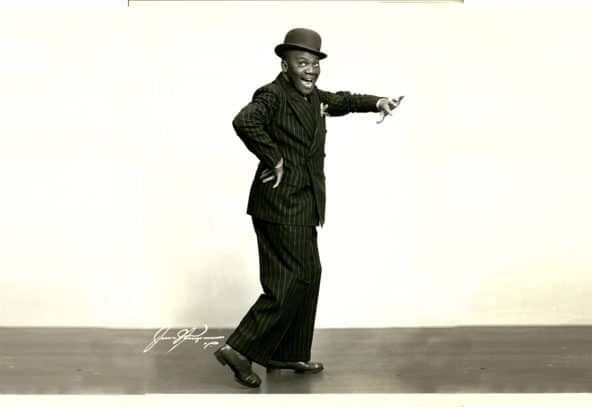Vaudeville

Photo Credit: Hennepin County Library
Bill “Bojangles” Robinson
Tap dancer
Excerpts from African American Registry:
Born Luther Robinson in Richmond, VA in 1878, he was raised by his grandmother after being orphaned as a baby. As a child, Robinson danced for pennies from passersby on the streets. He left school before the age of eight and ran away to Washington, D.C., where he worked as a stable boy at a racetrack. In Washington D.C., he observed traveling minstrel shows and copied aspects of their movement, eventually creating a unique dance style characterized by highly rhythmic, syncopated, and complex footwork that appeared effortless, carefree and buoyant.
He developed tap dance and soft-shoe routines (tap dances done in soft-soled shoes) in which he proved himself a master of improvisation, able to produce a seemingly unlimited range of percussive sounds. In 1892, Robinson debuted as a professional dancer in a minstrel show called The South Before the War. He later teamed with George Cooper in a dance and comedy vaudeville routine.
In 1908, Marty Forkins, a successful vaudeville agent, became his manager and helped Robinson become a vaudeville and musical theater star. Robinson performed in New York City in several Broadway musical revues, including Blackbirds of 1928 and Brown Buddies (1930), Blackbirds of 1933, and The Hot Mikado (1939). In 1930 he went to Hollywood, CA, where he appeared in fourteen motion pictures.
His work with American child actor Shirley Temple in four motion pictures. The Little Colonel (1935), in which he memorably taught Temple his trademark stair dance; The Littlest Rebel (1935); Rebecca of Sunnybrook Farm (1938); and Just Around the Corner (1938) were particularly popular. Robinson later drew criticism for having portrayed racial stereotypes in his roles as grinning and acquiescent servants. His last motion-picture role was opposite Black singer Lena Horne in the musical Stormy Weather (1943), which had an all-Black cast. Bill Robinson was known for his skill and originality, and one of the first Black entertainers to achieve popularity among different races in the United States.
For more on Bill Robinson visit: https://aaregistry.org/story/bill-robinson-pioneering-dancer-who-crossed-over/